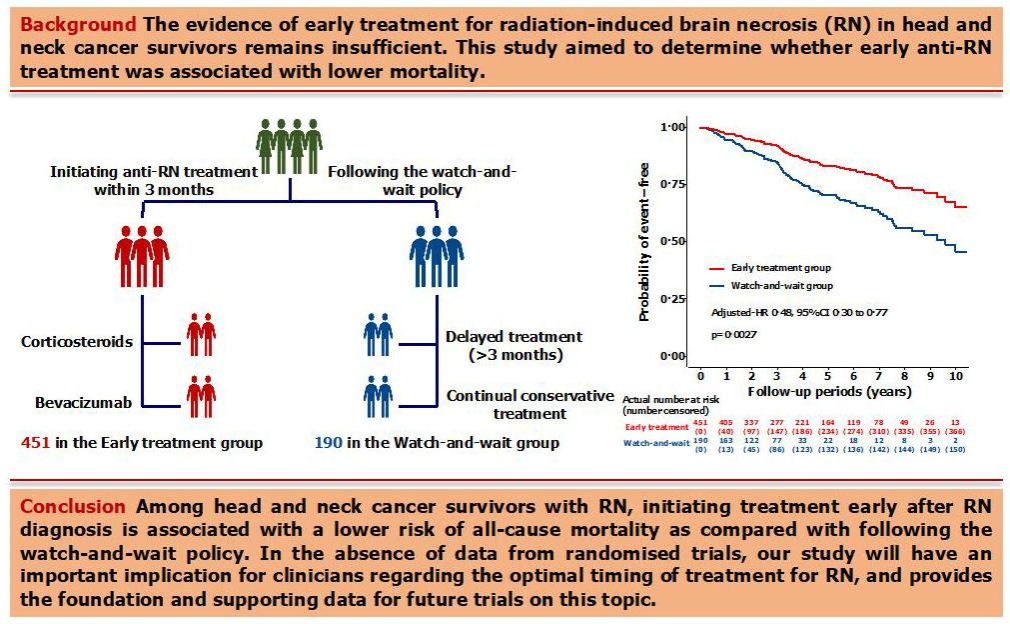Radiotherapy (RT) is an integral modality in the treatment of head and neck cancers (HNC), especially for nasopharyngeal carcinoma, which is prevalent in Southern China. However, radiation may result in brain necrosis, a severe, irreversible or even life-threatening cerebral complication, since healthy brain tissue in or around the RT fields could be damaged. The optimal timing of initiating medical treatment for radiation-induced brain necrosis (RN) is a challenging clinical decision for clinicians, yet the evidence of early treatment for RN in HNC survivors remains insufficient since no relevant studies have investigated whether early anti-RN treatment would be associated with better prognosis.

Graphical abstract of study findings
In this cohort study, Prof. Yamei Tang's team utilized data from the Study in Radiotherapy-related Nervous System Complications and Hong Kong Cancer Registry, including consecutive patients who had received RT for HNC and had subsequently developed RN between January 2005 and January 2020. The primary outcome is all-cause death. The researchers compared patients who received early treatment (initiating bevacizumab or corticosteroids treatment within three months after RN diagnosis) with patients who did not (following a “watch-and-wait” policy). This study demonstrated that the early treatment group had a 52% decreased risk of all-cause death compared with the watch-and-wait group, and there was no significant difference in the effect of early treatment on post-RN survival among subgroups stratified by presence or absence of neurological symptoms at baseline.
The researchers reveal that initiating treatment early after RN diagnosis is associated with a lower risk of all-cause mortality as compared with following the watch-and-wait policy, irrespective of whether patients exhibit symptoms or not, among HNC survivors with RN. In the absence of data from randomized trials, this study will have an important implication for clinicians regarding the optimal timing of treatment for RN, and provides the foundation and supporting data for future trials on this topic.
This research was online published in eClinicalMedicine entitled “Mortality of early treatment for radiation-induced brain necrosis in head and neck cancer survivors: A multicentre, retrospective, registry-based cohort study” on August 11, 2022. Sun Yat-sen Memorial Hospital is the first institution to complete the study, and cooperation units include Guangzhou Medical University, The University of Hong Kong, Sun Yat-sen University Cancer Center, National Cancer Center Singapore, Duke-NUS Medical School (Singapore), New York Proton Centre and Memorial Sloan Kettering Cancer Centre (USA), Marche Polytechnic University (Italy), Guangdong Provincial Key Laboratory of Malignant Tumor Epigenetics and Gene Regulation, and Guangdong Province Key Laboratory of Brain Function and Disease. Dong Pan (2022 Ph.D. student) from Sun Yat-sen Memorial Hospital, Dr. Xiaoming Rong from Sun Yat-sen Memorial Hospital, and Prof. Dongping Chen from Guangzhou Medical University are the co-first authors. Prof. Yamei Tang is the sole corresponding author. The study was supported by the National Natural Science Foundation of China, the Science and Technology Program of Guangzhou, and others.
The full text is available at:https://www.thelancet.com/journals/eclinm/article/PIIS2589-5370(22)00348-0/fulltext



